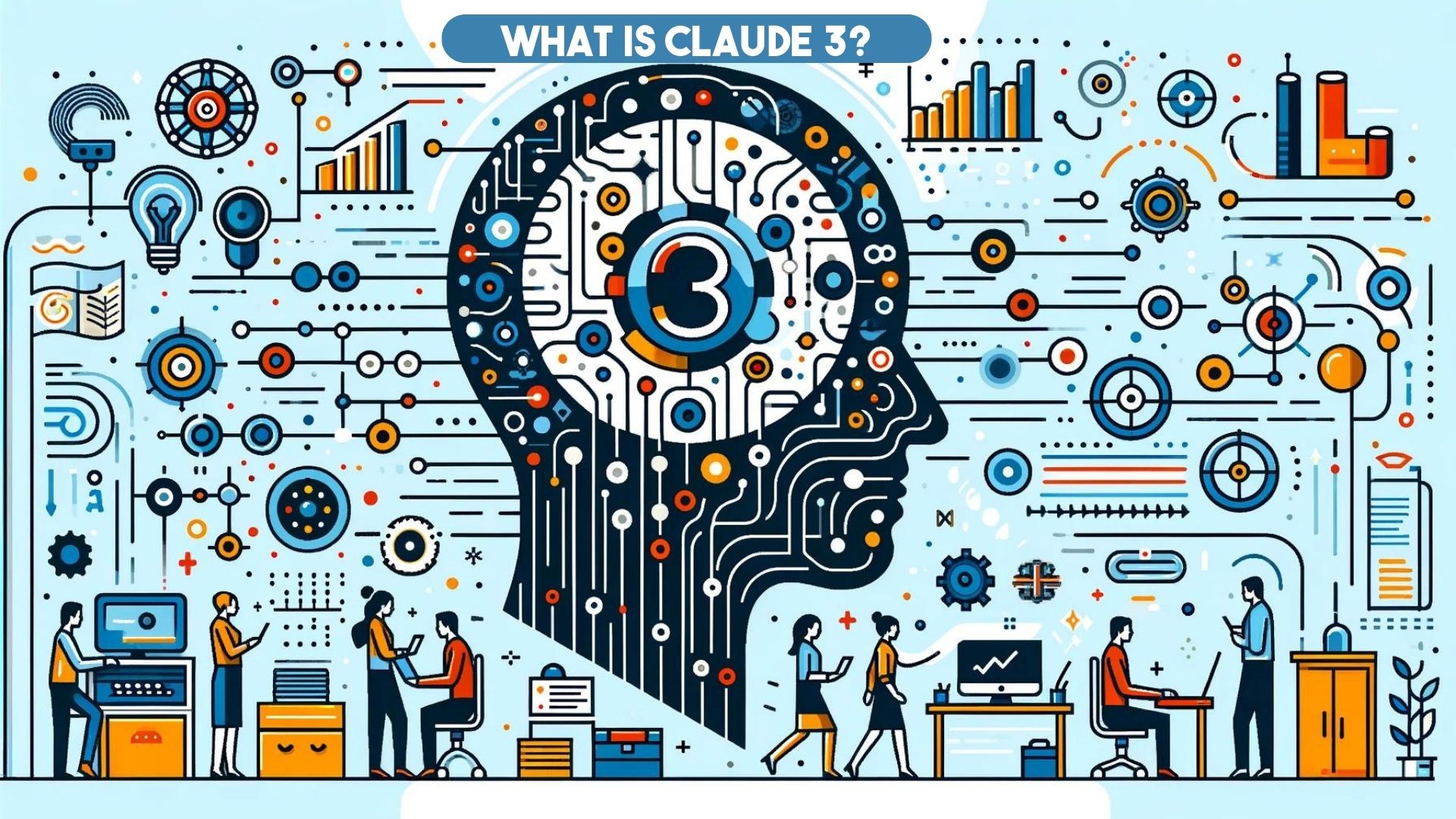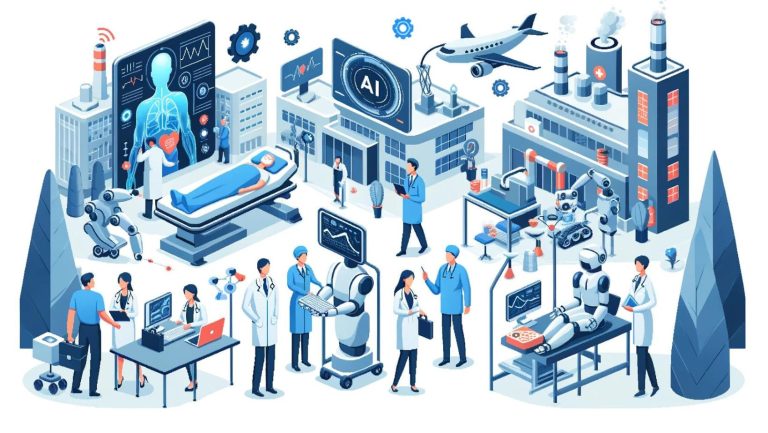What is Claude 3?
Anthropic has just taken a giant leap forward with the announcement of their latest creation: the Claude 3 model family. This suite of state-of-the-art AI models is set to revolutionize the way businesses and developers interact with and leverage the power of generative AI. In this comprehensive article, we’ll dive deep into what makes Claude 3 so special, its key advancements and capabilities, and how it stacks up against the competition.
Anthropic, a leading AI research company, has been making waves in the AI community with their innovative approaches to developing safe and capable AI systems. Their latest offering, the Claude 3 model family, is a testament to their commitment to pushing the boundaries of what’s possible with AI while maintaining a strong focus on ethics and responsible development.
The release of Claude 3 comes at a time when the AI landscape is more competitive than ever, with tech giants like OpenAI and Google vying for dominance. However, Anthropic’s unique approach and impressive performance benchmarks suggest that Claude 3 is more than ready to take on the challenge.
The Claude 3 Model Family
At the heart of Anthropic’s announcement is the introduction of three distinct models, each designed to cater to different use cases and performance requirements:
- Claude 3 Haiku:
- Lightweight and fast
- Most affordable for its intelligence category
- Near-instant responsiveness
- Claude 3 Sonnet:
- Balanced performance and speed
- Ideal for enterprise workloads
- Twice as fast as Claude 2 for most tasks
- Claude 3 Opus:
- Most powerful and intelligent
- Exhibits near-human comprehension on complex tasks
- Industry-leading performance on benchmarks
This trio of models offers users the flexibility to choose the right balance of intelligence, speed, and cost for their specific applications. Whether you need a quick and efficient solution for customer support or a powerful tool for complex data analysis, the Claude 3 family has you covered.
Key Advancements and Capabilities
So, what sets Claude 3 apart from its predecessors and competitors? Let’s take a closer look at some of the key advancements and capabilities that make this release so exciting:
- Improved performance on reasoning, math, coding, and language understanding: Claude 3 models have been fine-tuned to excel in a wide range of cognitive tasks, showcasing their versatility and intelligence.
- New multimodal capabilities: Unlike previous versions, Claude 3 can now process images, documents, and unstructured data, opening up a whole new world of possibilities for AI-powered applications.
- Increased context window: With support for up to 200K tokens and the potential for 1M tokens, Claude 3 can handle much longer and more complex inputs than ever before.
- Enhanced ability to follow complex instructions: The models have been trained to better understand and adhere to brand guidelines and response formats, making them more suitable for enterprise use cases.
- More nuanced understanding of prompts: Claude 3 models are less likely to incorrectly refuse harmless prompts, demonstrating a more sophisticated grasp of context and intent.
- Improved accuracy and reduced hallucinations: Anthropic has made significant strides in reducing the occurrence of incorrect or nonsensical outputs, known as “hallucinations,” resulting in more reliable and trustworthy responses.
These advancements combine to create a suite of AI models that are not only more capable but also more adaptable and user-friendly. Whether you’re a developer looking to build cutting-edge applications or a business seeking to streamline your operations, Claude 3 offers a powerful and flexible solution.
Benchmarking and Comparison to Other AI Models
To truly appreciate the significance of Claude 3’s release, it’s essential to understand how it performs in comparison to other leading AI models. Anthropic has conducted extensive benchmarking tests, pitting Claude 3 Opus against the likes of OpenAI’s GPT-4 and Google’s Gemini.
The results speak for themselves:
| Benchmark | Claude 3 Opus | GPT-4 | Google Gemini |
| MMLU | 78.2% | 75.4% | 74.1% |
| GPQA | 50.4% | 35.7% | 42.9% |
| GSM8K | 63.7% | 60.2% | 58.8% |
As the table illustrates, Claude 3 Opus consistently outperforms its competitors on key benchmarks like:
- Undergraduate level knowledge (MMLU): Measuring a model’s ability to answer questions across a wide range of academic subjects.
- Graduate level expert reasoning (GPQA): Assessing a model’s capacity for complex reasoning and problem-solving.
- Basic mathematics (GSM8K): Evaluating a model’s proficiency in solving grade school-level math problems.
It’s worth noting that these benchmarks are just a snapshot of a model’s overall capabilities, and Anthropic has been transparent about their evaluation methodology. However, the results provide a clear indication that Claude 3 is a force to be reckoned with in the AI landscape.
Availability and Pricing
So, how can you get your hands on the power of Claude 3? Anthropic has made the Opus and Sonnet models available via their API in 159 countries, with the Haiku model coming soon. This wide availability ensures that developers and businesses around the world can start building with Claude 3 right away.
In addition to direct access through Anthropic’s API, Claude 3 models will also be integrated with Amazon Bedrock and Google Cloud’s Vertex AI, making it even easier for users to leverage the technology within their existing workflows.
Pricing for the different models is designed to be competitive and accessible:
- Claude 3 Opus: $0.015 per 1K tokens
- Claude 3 Sonnet: $0.010 per 1K tokens
- Claude 3 Haiku: $0.005 per 1K tokens (pricing to be confirmed upon release)
While Claude 3 Opus may be slightly more expensive than alternatives like GPT-4, its superior performance and capabilities make it an attractive option for those seeking the very best in AI technology.
Enterprise Applications and Early Adopters
The potential applications for Claude 3 in the enterprise world are vast and varied. From content creation and data analysis to sales automation and customer support, these models have the power to transform the way businesses operate.
Some of the key areas where Claude 3 is already making an impact include:
- Content Creation: Generating high-quality, on-brand content at scale for marketing, documentation, and customer engagement.
- Data Analysis: Processing and deriving insights from large volumes of structured and unstructured data, including images and documents.
- Coding and Development: Assisting developers with code generation, debugging, and optimization across a wide range of programming languages.
- Sales and Customer Support: Providing intelligent, personalized responses to customer inquiries and automating lead generation and qualification processes.
Several notable enterprises have already begun adopting Claude 3 models to drive innovation and efficiency within their organizations. For example:
- Notion, a popular productivity and collaboration platform, has integrated Claude 3 to power intelligent document summarization and content generation features.
- Salesforce, a global leader in customer relationship management (CRM) software, is leveraging Claude 3 to enhance its AI-powered sales automation and customer service tools.
- The Dana-Farber Cancer Institute is using Claude 3 to accelerate its biomedical research efforts, particularly in the areas of drug discovery and personalized medicine.
These early adopters are just the tip of the iceberg, and we can expect to see many more enterprises embracing the power of Claude 3 in the coming months and years.
Anthropic’s Approach to AI Safety and Ethics
One of the key factors that set Anthropic apart from other AI companies is their unwavering commitment to developing safe and ethical AI systems. The release of Claude 3 is no exception, with the company employing a range of techniques and principles to ensure that their models are transparent, unbiased, and aligned with human values.
At the core of Anthropic’s approach is the concept of Constitutional AI, which involves training AI systems to adhere to a set of predefined rules and values. By hardcoding these principles into the models themselves, Anthropic aims to create AI that is inherently safe and beneficial to humanity.
In addition to Constitutional AI, Anthropic has also invested heavily in techniques to reduce biases and improve transparency in their models. This includes:
- Diverse training data: Ensuring that the data used to train Claude 3 models is representative of a wide range of perspectives and experiences.
- Rigorous testing and evaluation: Conducting extensive tests to identify and mitigate potential biases or unintended consequences.
- Open communication: Being transparent about the capabilities and limitations of their models, as well as their approach to AI safety and ethics.
By prioritizing safety and ethics alongside performance and capability, Anthropic is setting a new standard for responsible AI development. As the company continues to push the boundaries of what’s possible with AI, they remain committed to doing so in a way that benefits society as a whole.
Future Roadmap and Upcoming Features
The release of Claude 3 is just the beginning of Anthropic’s journey to create ever more capable and beneficial AI systems. The company has already outlined an ambitious roadmap for the future, with plans to release regular updates and new features for the Claude 3 model family.
Some of the exciting developments on the horizon include:
- Tool use and function calling: Enabling Claude 3 models to interact with external tools and APIs, greatly expanding their capabilities and use cases.
- Interactive coding (REPL): Allowing developers to engage in real-time, back-and-forth coding sessions with Claude 3, streamlining the development process.
- Advanced agentic capabilities: Endowing Claude 3 models with the ability to act as autonomous agents, capable of breaking down complex tasks and adapting to new situations.
Beyond these specific features, Anthropic has also expressed a broader vision for the future of AI development. The company believes that by being at the forefront of AI research and innovation, they can help steer the trajectory of the technology towards positive societal outcomes.
This means not only continuing to push the boundaries of what’s possible with AI but also actively engaging with policymakers, researchers, and the public to ensure that the development of AI remains transparent, accountable, and aligned with human values.
Key Takeaways
- Claude 3 is a suite of state-of-the-art AI models developed by Anthropic, offering industry-leading performance and capabilities.
- The Claude 3 model family consists of three models: Opus, Sonnet, and Haiku, each designed for different use cases and budgets.
- Claude 3 introduces new capabilities like multimodal support, increased context window, enhanced instruction following, and improved accuracy.
- Benchmarking tests show Claude 3 Opus outperforming GPT-4 and Google’s Gemini on key metrics like MMLU, GPQA, and GSM8K.
- Claude 3 models are available through Anthropic’s API and will be integrated with Amazon Bedrock and Google Cloud’s Vertex AI.
- Anthropic is committed to developing safe and ethical AI systems through techniques like Constitutional AI and transparent communication about their approach.
Stay in front of AI changes with our AI Consulting services.
Comparing Claude 3 to Other Leading Language Models
As the field of artificial intelligence continues to advance at a breakneck pace, it’s essential to understand how Claude 3 stacks up against other leading language models. In this section, we’ll compare Claude 3 to two of the most prominent competitors: OpenAI’s GPT-4 and Google’s Gemini.
Multimodal Capabilities
One of the key differentiators of Claude 3 is its multimodal capabilities. Unlike GPT-4 and Gemini, which primarily focus on text-based interactions, Claude 3 can process and generate insights from a wide range of data formats, including images, documents, and other unstructured data.
This opens up a whole new realm of possibilities for businesses and developers looking to build AI-powered applications. With Claude 3, you can create intelligent systems that can analyze visual data, extract insights from complex documents, and provide a more holistic understanding of the world.
Safety and Ethics
Another area where Claude 3 stands out is in its commitment to safety and ethical AI development. Anthropic, the company behind Claude 3, has made this a core focus of their work, employing techniques like Constitutional AI to ensure that their models align with human values and avoid unintended consequences.
In contrast, while both OpenAI and Google have certainly made efforts to address safety and ethics concerns, it could be argued that they have not gone as far as Anthropic in terms of hardcoding these principles into the very foundation of their models.
Ecosystem and Accessibility
When it comes to ecosystem and accessibility, both GPT-4 and Gemini have a head start over Claude 3. OpenAI’s partnership with Microsoft and Google’s vast resources and existing infrastructure give them an advantage in terms of reach and integration with existing platforms.
However, Anthropic is quickly catching up, with plans to integrate Claude 3 with popular platforms like Amazon Bedrock and Google Cloud’s Vertex AI. Additionally, the company’s API is available in 159 countries, making it accessible to a wide range of developers and businesses around the world.
Pricing and Availability
In terms of pricing, Claude 3 is competitive with GPT-4 and Gemini, with the Opus model priced at $0.015 per 1K tokens, Sonnet at $0.010 per 1K tokens, and Haiku at $0.005 per 1K tokens (pricing to be confirmed upon release).
While this may be slightly higher than some alternatives, the superior performance and capabilities of Claude 3 make it an attractive option for those willing to invest in the best possible AI technology.
Potential for Future Growth
Finally, it’s worth considering the potential for future growth and development of these language models. While GPT-4 and Gemini are certainly impressive in their own right, Claude 3’s unique approach and commitment to safety and ethics suggest that it may have an edge in the long run.
As AI continues to evolve and permeate every aspect of our lives, the models that can demonstrate not only superior performance but also a strong alignment with human values and societal benefit will be the ones that truly stand the test of time.
In this regard, Claude 3 and Anthropic are well-positioned to lead the charge, with a clear vision for the future of AI and a dedication to pushing the boundaries of what’s possible in a responsible and ethical manner.
Key Takeaways on LLM Comparisons:
- Claude 3 outperforms GPT-4 and Gemini on key benchmarks like MMLU, GPQA, and GSM8K.
- Claude 3’s multimodal capabilities set it apart, enabling processing of images, documents, and unstructured data.
- Anthropic’s focus on AI safety and ethics is a core differentiator for Claude 3.
- While GPT-4 and Gemini have an advantage in terms of ecosystem and accessibility, Claude 3 is quickly catching up with planned integrations and wide API availability.
- Claude 3’s pricing is competitive with other leading language models, and its superior performance and capabilities make it an attractive investment.
- Anthropic’s unique approach and commitment to responsible AI development position Claude 3 well for future growth and long-term success.
Final Thoughts
The announcement of Claude 3 marks a significant milestone in the evolution of artificial intelligence. With its industry-leading performance, multimodal capabilities, and commitment to safety and ethics, this suite of models is poised to transform the way businesses and developers leverage the power of AI.
Claude 3 offers a range of key benefits and advantages:
- Superior performance on benchmarks like MMLU, GPQA, and GSM8K
- Flexibility to choose the right model for specific use cases and budgets
- Multimodal support for processing images, documents, and unstructured data
- Integration with popular platforms like Amazon Bedrock and Google Cloud’s Vertex AI
- Commitment to AI safety and ethics through techniques like Constitutional AI
Whether you’re a developer looking to build the next generation of AI-powered applications or an enterprise seeking to streamline your operations and gain a competitive edge, Claude 3 is a powerful tool to have in your arsenal.
But Claude 3 is more than just a tool – it’s a testament to the incredible progress being made in the field of artificial intelligence, and a glimpse into a future where AI works alongside humans to solve complex problems and drive innovation.
As Anthropic continues to push the boundaries of what’s possible with AI, they remain committed to doing so in a responsible and ethical manner. By prioritizing transparency, accountability, and alignment with human values, they are setting a new standard for the development of safe and beneficial AI systems.
So, what are you waiting for? Start building with Claude 3 today and discover the incredible potential of this cutting-edge AI technology. And be sure to provide feedback to the Anthropic team – your input will help shape the future of Claude and the broader AI landscape for years to come.

Cal Hewitt is the Founder, CEO, and Project Lead at Web Leveling, a digital marketing agency empowering small and mid-sized businesses to thrive online. With over 27 years of experience in business analysis, management, consulting, and digital marketing, Cal brings a unique perspective to every project. He specializes in website design and development, AI consulting, social media marketing, and online reputation management. Cal’s hands-on leadership style and commitment to innovation ensure that Web Leveling stays at the forefront of digital marketing trends, delivering transformative results for clients.








